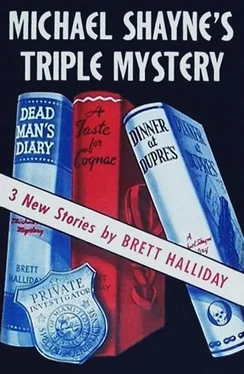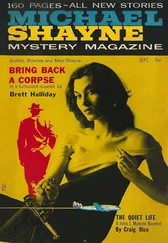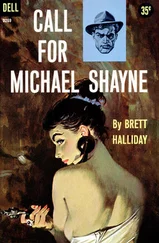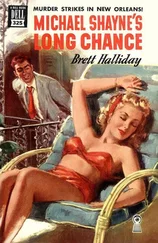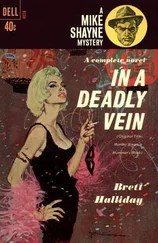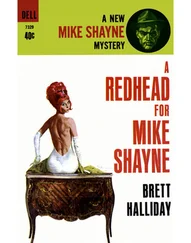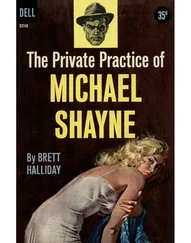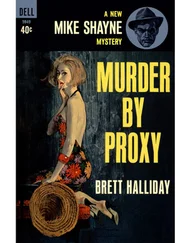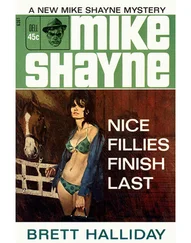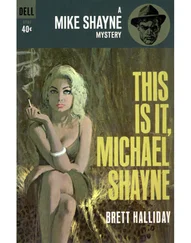“None,” Gentry rumbled. “You can beat it, Mike, unless you feel like telling the truth.”
“But we have told the truth,” Myrna asserted, her eyes wide and childlike. “We were just—”
Shayne took her arm tightly. He said, “Come on,” and led her out the door.
Neither of them said anything until they were in Shayne’s car and headed for the boulevard. Then Myrna leaned her head against his shoulder and asked in a small voice, “Are you terribly angry with me, Mike?”
“How did you get in that house?” he countered angrily.
“You brought me. I hid in the trunk compartment of your car. Then I slipped into the house while you were searching the body. I was in the rear bedroom all the time, and when I heard you getting the third degree I knew you didn’t want to tell the truth and I thought I’d better stick my oar in. Didn’t I do all right?”
“How did you know the Captain’s name and about him being shipwrecked?”
Myrna chuckled softly. “I found an old logbook by his bed. I had my flashlight, and found a clipping that was in the book.” She patted a large suede handbag in her lap. “I’ve got the book in here. It made a pretty good story even if I did think of it on the spur of the moment — the one I told Chief Gentry, I mean,” she amended, and chuckled again.
“Why did you hide in the back of my car,” Shayne snapped.
“Because you were trying to get rid of me and I wanted to see the famous Michael Shayne in action,” she said. “But I must say you didn’t do much detecting out there.”
Shayne stopped the car suddenly in front of an apartment building on the river front. “I live here,” he told her. He got out and went toward a side entrance.
Myrna Hastings tripped along with him, trying to keep pace with his long-legged strides. She said hopefully, “I’m dying to taste whatever is in that bottle you’ve got in your coat pocket.”
She waited quietly behind him in the doorway while he unlocked his apartment door. He went inside and switched on the lights, and she followed him into a square living room with windows on the east side. There was a studio couch against one wall, and a door on the right opened into a kitchenette. Another door on the left led into the bedroom and bath. Shayne tossed his hat on a wall hook and went into the kitchen without a word or glance for Myrna. He returned presently with two four-ounce wine glasses and two tumblers filled with ice water. He walked past her, ranged the four glasses in a row on the table, and filled the wine glasses nearly to the brim with cognac. He pushed one of the tumblers toward Myrna, set one wine glass within easy reach of her hand, then pulled another chair to the table and sat down, half facing her.
It was very quiet in the apartment, and very restful. Shayne sighed when he drained the last drop from his glass of Monnet. He frowned at the portion remaining in Myrna’s glass. “Don’t you appreciate good liquor?”
She smiled and said, “It’s so good I’m making it last.”
Shayne lit a cigarette and spun the match away, then got the purloined clipping and bus ticket stub from his pocket. He laid the stub on the table and read the short clipping aloud. It was an AP dispatch from Atlanta, Georgia.
It stated that John Grossman, suspected prohibition-era racketeer, sentenced to federal prison in 1930 on income tax charges from Miami, Florida, had been released that day on parole. Grossman announced his intension to take a long vacation at his fishing lodge on the Florida Keys.
When Shayne finished reading the clipping aloud he placed it beside the ticket stub and said to Myrna, “These two items were the only things I found in the dead man’s pockets.”
“You didn’t tell Chief Gentry about them?”
He shook his red head in slow negation.
“Isn’t that against the law? Concealing murder evidence? Who’s John Grossman and why was the old sea captain interested in the clipping about his parole?”
Shayne said, “I remember Grossman. He was one of our bigtime bootleggers with a clientele willing to pay plenty for high-class imported stuff. Like Monnet. I don’t know why the Captain was interested in Grossman’s release.”
“What’s it all about, Mike?” Myrna leaned forward eagerly. “It began back in the tavern with something odd about those drinks, didn’t it? Why did you go back to the proprietor’s office and come out with a bottle, and then drive straight out to the scene of the murder?”
Shayne said softly, “You’ve done me two good turns tonight. One, when you knocked on the door of Renaldo’s office, then out at the Captain’s house when I didn’t see how in hell I was going to explain my presence there without telling the truth.” He hesitated, then admitted, “You deserve a break. You’re in it now because you lied to Gentry and he’ll probably discover you lied.”
He began at the beginning and related what had happened in Renaldo’s office. “You know what happened after I drove out to the house.”
“Then this is real prewar cognac?” Myrna lifted her glass to study it, and her voice was incredulous.
“Monnet 1926,” Shayne stated flatly. “The Captain sold Renaldo a case of it for a hundred dollars, and was tortured to death immediately afterward. Renaldo admits he had his men follow the Captain to try to persuade him to tell them where they could get more, but they claim he was dead before they got to him.”
“Do you believe them?”
Shayne shook his head. “It doesn’t do to believe anything when murder is involved. Their story sounded all right, but that wire and those torn fingernails could very well be their idea of gentle persuasion. And if the Captain did fool them by dying before they got the information they wanted, they’d hate to admit it to Renaldo and might have made up that story about his being murdered by an unknown visitor.
“And there’s another angle. Maybe Blackie and Lennie are playing it smart and did get the information before the Captain croaked. If they decided to use it themselves and cut Renaldo out—” He paused and shrugged expressively.
“What makes you and Renaldo so sure there’s more cognac where that first came from?”
“I imagine it was just a hopeful hunch on Renaldo’s part. And I wasn’t sure until I found this clipping indicating a connection between the Captain and an ex-bootlegger.”
“Would that be sufficient motive for murder? At a hundred dollars a case?”
Shayne made a derisive gesture. “A G-note for two dozen bottles of Monnet is peanuts today. That’s what got Renaldo so excited. It shows that the Captain knew nothing about the present liquor shortage and market prices. It could retail for twenty or twenty-five dollars a bottle if properly handled today.”
Myrna Hastings’s eyes widened. “That would be about five hundred dollars a case!”
Shayne’s eyes were morose. “If Grossman had a pile of it cached away when he was sent up in ’30,” he mused, “that would explain why it stayed off the market all this time. But Grossman would know what the stuff is worth today.” He shook his head angrily. “It still doesn’t add up. And if the Captain knew about the cache and had access to it all the time, why wait until a week after Grossman’s parole to put it on the market? Did you notice the condition of the Captain’s body?” he asked abruptly.
Myrna shuddered. “I’ll never forget it,” she vowed.
“He looked like an advanced case of malnutrition,” said Shayne harshly.
“Who was the white-haired man who brought the police — that Mr. Guildford?”
“He’s a lawyer here. Very respectable.”
Myrna said hesitantly, “His story about waiting at the house half an hour for Captain Samuels to keep an appointment — Do you think he could be the man the gangsters saw drive away from the house just before they went in and found the Captain dead?”
Читать дальше
